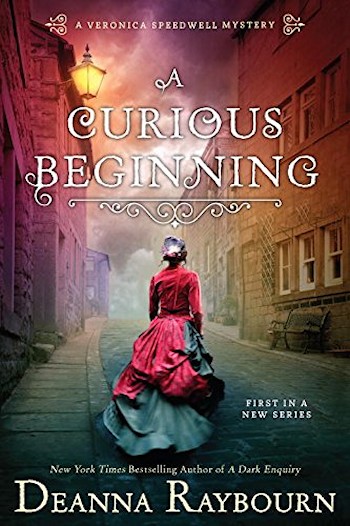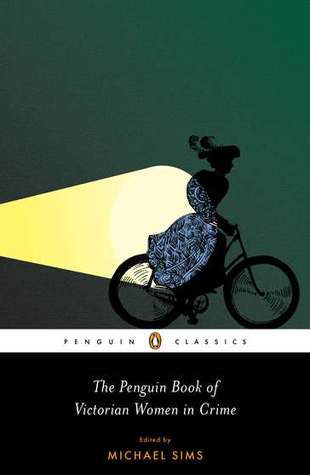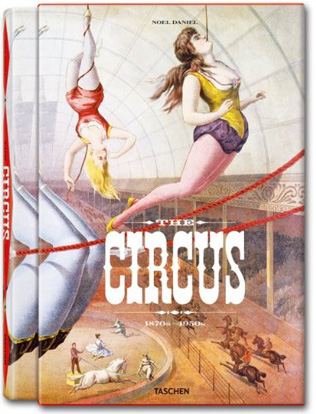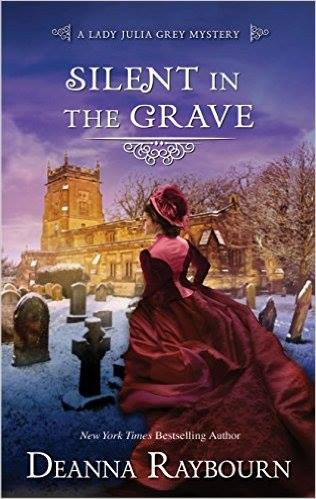From The Booking Desk:
I am thrilled to welcome Deanna Raybourn to BOLO Books for this launch day interview. The first novel is her new Victorian mystery series, A Curious Beginning, is out today. If you missed my spoiler-free review of this wonderful series debut, check it out here.
Also, if you have not read Deanna’s Lady Jane Grey mysteries, be sure to check them out as well. You won’t be sorry.
BOLO Books: Like the Lady Julia Grey series, A Curious Beginning is set during the Victorian Era. How do these two series differ in terms of the world in which they inhabit and the characters who populate it?
Deanna Raybourn: They’re set in almost precisely the same timeline—the bulk of Julia’s first adventure is 1887, the same as Veronica’s. But they do live in quite different worlds. Julia is the beloved daughter of an earl with the Princess of Wales for a godmother. She has lived a quite sheltered life in a rarified atmosphere. Veronica is essentially a foundling who has traveled the world on her own wits, answerable to no one. She has love affairs; she works for a living.
 The dynamic each has with her lead male character is quite different as well. Julia’s Brisbane is half-Roma and works as a private enquiry agent while Stoker is an aristocrat, the son of a viscount. His background could hardly be more “establishment” even if he is constantly doing his best to belie it. He loves nothing more than to get his hands dirty tearing apart a taxidermy specimen and rebuilding it. Because of their shared work, Veronica and Stoker connect immediately in a way that took much longer for Julia and Brisbane. They are compatriots and colleagues rather than sweethearts, so it makes for a very different sort of relationship. Julia and Brisbane had a sort of push-me/pull-you interaction while Veronica and Stoker are quite happy to battle for the alpha role!
The dynamic each has with her lead male character is quite different as well. Julia’s Brisbane is half-Roma and works as a private enquiry agent while Stoker is an aristocrat, the son of a viscount. His background could hardly be more “establishment” even if he is constantly doing his best to belie it. He loves nothing more than to get his hands dirty tearing apart a taxidermy specimen and rebuilding it. Because of their shared work, Veronica and Stoker connect immediately in a way that took much longer for Julia and Brisbane. They are compatriots and colleagues rather than sweethearts, so it makes for a very different sort of relationship. Julia and Brisbane had a sort of push-me/pull-you interaction while Veronica and Stoker are quite happy to battle for the alpha role!
BOLO Books: Veronica Speedwell has the feel of a modern heroine while still staying true to the time in which she lives. Tell us about how you developed her as your main character for a new series.
Deanna Raybourn: Veronica came about through years of research into Victorian lady explorers. It’s one of my pet subjects, and I have read everything I could get my hands on with regard to the “petticoat and parasol” brigade. They were the absolute opposite of everything we think we know about Victorian women. Instead of staying home, arranging flowers for the church, and practicing their needlework, these women traveled the world, daring to go in some cases into lands their male counterparts would never dream of exploring. Some were archaeologists, some were natural historians, some were simply travelers, but all were deeply fascinating women who didn’t hesitate to push aside societal expectations when they got in the way of a good time.
One of the most intriguing was Margaret Fountaine, a lepidopterist who hunted butterflies on six continents over the course of a career that spanned more than five decades. She kept copious journals and willed them—along with her collection of Lepidoptera—to an English university. When the journals were finally opened, they were full of deliciously salacious detail about the love affairs she had on her travels. She didn’t just collect butterflies, she collected men, flirting her way around the world quite unapologetically. That larger-than-life way of seizing adventure captivated me, and I knew I wanted to write a heroine who lived precisely that way. Veronica might just as easily have been a volcanologist or a watercolor painter, but I made her a lepidopterist in homage to Margaret Fountaine.
 BOLO Books: In my review of A Curious Beginning, I had some fun throwing in some subtle (or not so subtle) references to classics of Victorian literature. I am wondering what some of your favorites are and how did they influence the writing of this series debut?
BOLO Books: In my review of A Curious Beginning, I had some fun throwing in some subtle (or not so subtle) references to classics of Victorian literature. I am wondering what some of your favorites are and how did they influence the writing of this series debut?
Deanna Raybourn: The Sherlock Holmes stories are so obvious, I hesitate to mention them, but I remember reading “The Hound of the Baskervilles” in elementary school and being completely hooked on Victorian London and the idea that crime was festering under all the civility. I have a degree in English and history, so I read my fill of Dickens in college, but I read the Brontës for pleasure as well as early detective stories featuring female sleuths. The Penguin Book of Victorian Women in Crime is a particularly enjoyable introduction to a subgenre that is a little under the radar. There are also some superb digital anthologies of period detectives who happen to be women, and those have been great fun. I’m still working my way through, but those detectives have been a delightful source of inspiration for Veronica’s character.
BOLO Books: Veronica makes repeated references to being a fan of Arcadia Brown, Lady Detective. Is Arcadia a figment of your imagination?
Deanna Raybourn: Completely! As I mentioned, I love the fictional Victorian female detectives—Amelia Butterworth, Violet Strange, Loveday Brooke—but I thought it would be more enjoyable to create my own. I gave her a “color” name in homage to Lady Julia Grey, and I provided her with a sidekick, Garvin, as a nod to Modesty Blaise, another of Veronica’s influences. I’ve given her a catch phrase—“Excelsior!”—and some really over the top titles like ARCADIA BROWN AND THE CASE OF THE PURLOINED PARURE. My favorite running joke is that Stoker is quite sniffy about Veronica’s taste in sensationalist literature but he keeps stealing the books to read when she isn’t looking.
BOLO Books: Stoker is a very interesting character. He is a naturalist and a taxidermist by profession. Given the news stories lately about the Cecil the Lion tragedy, reading the sections depicting his taxidermy work was not always easy. And yet, he is very much a product of his time. How did he develop for you?
Deanna Raybourn: It’s been a balancing act to write a character like Stoker since I oppose trophy hunting, but I’ve also done a fair bit of research into early museum collections and am fascinated by how they were assembled. Most of us have seen natural history exhibits with animal mounts—those in the Akeley Hall of African Mammals in NYC’s natural history museum are particularly splendid—and I was intrigued to find out that in many, many cases, the scientist responsible for assembling the display was also responsible for securing the animal in the first place. The natural historian would go on expedition and have to hunt for the necessary specimens, so from tracking an animal to transporting the trophy to preserving it via taxidermy to designing and creating the display, the scientist had to do it all. He had to have tremendous nerve, creativity, skill; he absolutely had to be a renaissance man, which makes him an ideal model for a character.
The difficulty is how to reconcile that with modern attitudes—and my own for that matter. I kept digging, and what I found was that Stoker is perfectly placed in history to be at the cusp of the conservation movement. His convictions are evolving based upon his life experiences, and he is moving from being a person who went out and bagged trophies in the name of science to a person who is solely interested in preserving what has already been taken, in using those specimens to educate and conserve. That sort of growing awareness makes him a very modern man for his time but completely within the boundaries of history. The fact that he struggles with these questions and is willing to adapt his principles makes him relatable to a modern reader.
BOLO Books: The section of the novel where Veronica and Stoker spend time with the traveling circus was very interesting and enlightening about entertainment during the Victorian period. What type of research did you do to get those details correct?
 Deanna Raybourn: Luckily for anyone interested in the Victorian period, they kept copious records—diaries, letters, journals, almanacs, newspapers. Whatever your specific interest, you can find written information about it. In the case of the traveling show, I did a little research on P.T. Barnum, but he was ultimately far more successful than the type of impresario I created, so I had to scale it down. My best find was an utterly gorgeous book by Taschen simply called The Circus which had splendid photos and heaps of details. The rest was down to imagination—culling from the different forms of entertainment the Victorians liked and creating a traveling show which was a plausible compilation. We tend to think of circuses as animals and acrobats, but in the 19th-century there was a fair bit of what they would have considered “exotic” entertainment such as representatives of foreign cultures, freaks (as they were billed at the time), and cryptozoological oddities such as the Feejee Mermaid—a famous hoax fashioned from sewing a monkey to a fish and heavily promoted by Barnum. Behind each one of those is a very human story, and that’s what I was interested in exploring.
Deanna Raybourn: Luckily for anyone interested in the Victorian period, they kept copious records—diaries, letters, journals, almanacs, newspapers. Whatever your specific interest, you can find written information about it. In the case of the traveling show, I did a little research on P.T. Barnum, but he was ultimately far more successful than the type of impresario I created, so I had to scale it down. My best find was an utterly gorgeous book by Taschen simply called The Circus which had splendid photos and heaps of details. The rest was down to imagination—culling from the different forms of entertainment the Victorians liked and creating a traveling show which was a plausible compilation. We tend to think of circuses as animals and acrobats, but in the 19th-century there was a fair bit of what they would have considered “exotic” entertainment such as representatives of foreign cultures, freaks (as they were billed at the time), and cryptozoological oddities such as the Feejee Mermaid—a famous hoax fashioned from sewing a monkey to a fish and heavily promoted by Barnum. Behind each one of those is a very human story, and that’s what I was interested in exploring.
BOLO Books: The home our main duo eventually take sanctuary in – Bishop’s Folly – reads like a dream come true for those interested in art and artifacts. Would you want to live there if given the chance?
Deanna Raybourn: Absolutely! But only if I have a nice, clean, orderly space for sleeping. Oddly enough, when I conceived of the Belvedere, I had a very specific design in my head down to the floors, the pillars, the alcoves. And then a few weeks ago I walked into the natural history museum in London and realized it was precisely what I had pictured. It was a surreal and very strange moment. I had never even seen photos of the museum before, but it tallied perfectly with what I imagined. It just needs a few more exotic touches to be really perfect…
BOLO Books: Are you planning this as an open-ended series or do you have an overall end-point you are aiming for? By the end of this first novel, it is clear that Veronica and Stoker could certainly have countless adventures ahead.
Deanna Raybourn: The series is open-ended. I have absolutely no idea where they are going to end up which I rather like. I am happy to keep writing Veronica and Stoker adventures as long as my publisher wants them; I think there is endless scope for where they can go and what they can do.
 BOLO Books: The Victorian Era is very well represented when it comes to mystery novels. What is it about this period which makes modern authors see it as the perfect setting for sleuthing and detecting?
BOLO Books: The Victorian Era is very well represented when it comes to mystery novels. What is it about this period which makes modern authors see it as the perfect setting for sleuthing and detecting?
Deanna Raybourn: I think the inspiration starts with Holmes and Jack the Ripper. That combination of the world’s greatest detective and one of history’s most notorious serial killers is irresistible. I also think we are likely influenced by the contradictions between the face Victorian London presented and the reality behind the façade. There was a great emphasis on sexual propriety, and yet lots of illicit sex was happening—from the streetwalkers in Whitechapel to the fashionable brothels in Chelsea to aristocratic house parties that were a cover for rampant adultery. On the one hand it’s queen and country and the empire on which the sun never set, but there was a much more human, much seedier side, and I find that endlessly fascinating. We can also relate to Victorians in a way we might not be able to with people further back in history. So much of their world was familiar to us; they had electricity and department stores and escalators and vegetarians and beach holidays. Victorians are exotic to us but comfortably so.
BOLO Books: What’s next for Veronica and Stoker? Any hints about book two?
Deanna Raybourn: I can tell you they are sleuthing around London’s art circles at the behest of someone very highly placed…
BOLO Books: If forced to choose only one format for all your future reading, which would you choose: Hardback, trade paperback, mass-market paperback, or e-book? And why?
Deanna Raybourn: A cruel, cruel question. I would have to go with trade. I don’t enjoy reading mass-market paperbacks simply because I’m 47 and my eyes aren’t what they used to be. Hardcover is too difficult to hold up in the bathtub, and while I love my e-reader and the convenience of digital books, when I research I need a paper version in front of me. I like to highlight and make notes, plus I find I retain more information when I’ve read it off the page as opposed to the screen. By default, that leaves me with trade which is absolutely fine. I think it’s the most elegant format anyway!
From the Booking Desk:
I hope that you all enjoyed that as much as I did. And I do hope that you will give A Curious Beginning a try. Deanna Raybourn is currently on tour and I will be seeing her at both the Baltimore Book Festival and Bouchercon in Raleigh. Hope to see you there!
